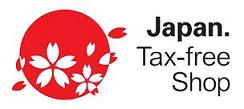Terms for Tax Exemption
As of October 1, 2014, duty-free products in Japan, previously limited to electronics and clothing, now include items such as consumable items (foods, drinks, medicines, cosmetics, etc.). As of May 2016, the tax-free minimum purchase amount has been reduced from more than ¥10,000 to ¥5,000.As of July 2016, the consumption tax rate in Japan stands at 8 percent.
Individuals eligible for Tax Exemption include:
(1) Foreign nationals who are staying in Japan for less than six months.
(2) Foreign nationals who are currently engaged in public services for a foreign government or an international organization.
(3) Japanese citizens who are departing Japan to stay and work in abroad.
(4) Japanese citizens who are departing Japan and staying abroad for more than 2 years.
(5) Other than (3) and (4), Japanese citizens who have lived abroad for more than 2 years.
How To Make Use of the Tax Exemption Program
1.Seek out Tax-Free Stores At Your Location
Most department stores in Japan offer a tax exemption program. Larger stores such as Takamatsu Mitsukoshi in Takamatsu-city have long been participating in the tax exemption program.The number of stores that offer the tax-exemption program in Takamatsu-city have been steadily increasing. A majority of the tax exempt stores will display signs saying “duty free” or “tax free” on their storefronts, or just inside the store’s entrance.


Please note that not all stores will display these signs, so be sure to ask the store clerk if their store follows this tax exemption policy.
2.Purchasing and Claiming Tax Exemption
Before you purchase your items, make sure that the store displays prices both with and without the additional taxes.The process of purchasing items and receiving your tax exemption will vary by the individual store, however they will follow one of two methods:
A) Upon showing your passport when purchasing items, you will only be asked to pay the price that excludes any consumption taxes.
B) Pay the full price when purchasing your items, then apply for tax exemption at the store (typically at a designated counter) to receive your refund. You will need to have your passport, item receipt, and any other documents provided to you at the time of purchase. This process also may result in a service charge.
If purchasing by credit card, the name on the card must match the name on the passport of the person applying for a tax exemption.Please note that in Japan, most places of business will accept major credit cards like Visa and Master Card, however many locations still only accept cash. When travelling, it is recommend that you have cash available for smaller establishments, such as independently owned stores and food kiosks.
Items Eligible For Tax Exemption / Minimum Tax-Free Purchase Amount:
- General Items: Shoes/Bags, Clothing, Accessories/Handicrafts, Electronics, Living Supplies etc.
The total purchase amount at the same store in a single day must be more than ¥5000 (excluding tax).
- Consumable Items: Foods, Beverages, Medicines, Cosmetics etc.
The total purchase amount at the same store in a single day must be more than ¥5000 and less than ¥500,000 (excluding tax).
Please Note:
General Items and Consumable Items must be calculated separately.Consumable Items will be placed in a sealed bag that must remain unopened until exiting Japan.
General Items must be taken out of Japan within 6 months after the purchase date.
Consumable items must be taken out of Japan within 30 days of the purchase date.
The tax exemption procedure must take place on the same day of your purchase.
3.Airport Customs Procedures
Approach a Customs counter and submit the proof of your tax free purchases (which will be attached to your passport) when leaving the country. Have any purchased items readily available for inspection if asked.If any Consumable Items have been opened, you will be asked taxed at Customs.
The information provided here is valid as of July 2016 and may be subject to change.

